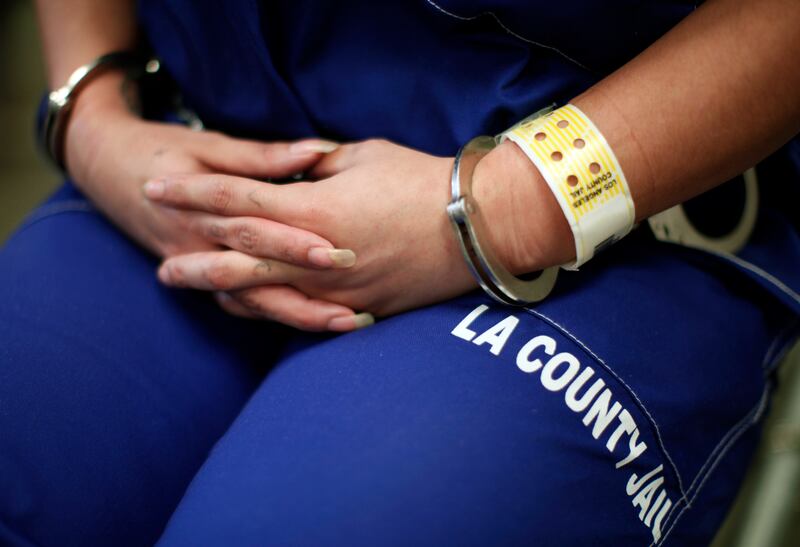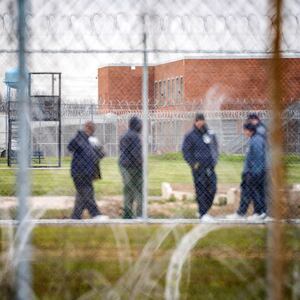As the pandemic continues to ravage U.S. jail populations, a total of five pregnant women have been diagnosed with COVID-19 in the Los Angeles County jail, according to lawyers suing the system for allegedly inadequate health protections.
Nearly 20 pregnant women are locked up in the country’s largest jail, according to lawyers for the ACLU; that’s double the number held there in May, when the county attempted to reduce the prison population due to the pandemic. The numbers crept back up over the intervening months, even as the virus continued to spread.
More than 3,500 people have been diagnosed with COVID-19 in the county jail system, and eight have died. Among those diagnosed over the course of the pandemic, according to the attorneys, are five pregnant women—most of whom have been subjected to harsh conditions like solitary confinement and denied medical care.
ADVERTISEMENT
The lawyers said one of the women, Teresa Gomez, learned she was pregnant shortly after being booked into the jail in August on an attempted murder charge. On Oct. 27, she came down with a fever and headaches and soon tested positive for COVID-19. Gomez told the lawyers she was placed in a dirty, cold, windowless solitary confinement cell—the kind generally used for discipline—where she did not even have space to walk around. She was given one hour a day outside of the cell, during which time she was supposed to both shower and make a single daily phone call.
In an affidavit, another COVID-positive former inmate, Catrina Balderrama, said her own isolation cell was like nothing she had ever seen before.
"There was no toilet paper or soap and there was old food under the bed and on the walls,” since-released inmate Catrina Balderrama wrote. “[The deputy] told me my release papers had come through and I was going home. When I got excited about this, she said ‘April Fools.’ She then proceeded to tell me, ‘See you later in hell when you die.’”

Because of delays associated with the pandemic, Gomez has yet to have a single substantive hearing in her case. She has served nearly four months in jail without a conviction, and her next hearing date is not until January.
“This woman found out she was pregnant when she got a pregnancy test in jail, and by January she’ll be something like seven months pregnant,” Theresa Zhen, one of the attorneys representing inmates at the jail, told The Daily Beast. “Depending on whether that court appearance goes through... she could live out her entire pregnancy term in jail without having had a substantive legal proceeding."
In a statement to The Daily Beast, the Department of Health Services declined to comment on pending litigation or specific cases, but said some of the attorneys’ claims were “inaccurate.”
“Los Angeles County prioritizes the safety and wellbeing of all our patients in the Los Angeles County Jail system and we work diligently to protect our patients from COVID-19,” said Tim Belavich, interim director of Correctional Health Services at the LA County Department of Health Services. “We follow public health guidance on prevention and management of COVID-19 in correctional settings and we ensure all patients have access to the health services they need based on their clinical history and conditions.”
The sheriff’s department directed a request for comment to the public records department, which did not respond by press time.
A coalition of legal groups—including Zhen’s law firm, Hadsell, Stormer, Renick & Dai, and the ACLU—is suing the jail on behalf of nine inmates. They claim the inmates do not have adequate soap or a safe way to maintain social distancing, and are not being tested for infection even when they show symptoms. The accusations echo similar claims made in dozens of prison lawsuits across the country, as inmates fight for early release or more sanitary conditions.
A research letter published in the Journal of the American Medical Association in July found rates of the coronavirus were 5.5 times higher in prisons than the general U.S. population. At least 197,659 inmates nationwide have contracted the virus, and at least 1,453 have died, according to the Marshall Project and the Associated Press. And the numbers are only increasing: By Nov. 17, the number of positive cases had climbed 8 percent over the previous week, and the number of deaths had gone up 3 percent.
“There have been efforts to improve the conditions [in jails and prisons,] but the central fact is there are simply too many people being housed in too confined spaces to allow for the implementation of social distancing,” said Eric Balaban, senior staff counsel at the ACLU National Prison Project and party to the L.A. County litigation.
“Jails are congregate environments, they are environments where there are many people closely packed together,” he added. “Jails are sort of a perfect incubator for the rapid transmission of this disease.”
The Centers for Disease Control recently added pregnant people to its list of those most vulnerable to the virus, noting that studies suggest they “might be at increased risk for severe illness associated with coronavirus disease.” Compared to women overall, pregnant people are significantly more likely to be admitted to the intensive care unit or placed on a ventilator. In some cases, pregnant women were twice as likely to die than other women in the same age group. The risk may be even higher for incarcerated women, who are statistically more likely to have underlying health conditions that exacerbate the effects of the disease.
Andrea Circle Bear became the first pregnant inmate to die in April. She was eight and a half months pregnant when she arrived at a Texas correctional facility in late March to serve out a two-year drug sentence, and was unconscious and on a ventilator when she went into labor on April 1. She delivered the baby via c-section and died 28 days later.
In response to outcry over Circle Bear’s death, and lobbying from activists and sitting U.S. senators, several states have released some of their pregnant inmates—albeit with limitations based on the nature of their offense and the time they have left to serve. (When The Guardian contacted all 50 states in May about whether they were releasing pregnant inmates, the majority of the 37 who replied said they had not done so.)
In Los Angeles, according to the attorneys, the remaining expectant mothers are being housed with the general inmate population or placed in solitary confinement as a means of “protection.” But along with this protection from the virus, advocates say, comes decreased access to medical care, the erosion of any kind of support network, and the emotional stress of being isolated from any meaningful personal contact.
In Gomez’s case, she told the attorneys she had experienced extreme cramping while in solitary, and was told by a deputy to simply lie down. She also claims she was denied toilet paper for hours when she requested it. She was released from confinement Nov. 13, but when she was transported to the hospital for her 20-week OB-GYN appointment three days later, the hospital turned her away because of her recent COVID-19 diagnosis. She does not know when she will be able to reschedule her appointment.
For pregnant inmates like Gomez, Zhen said, “there’s also the fear of living out your pregnancy term—this very special and critical point in your life and your baby’s life—in a facility where you have no control over the type of care you get, or even how you take care of yourself.”
“That sets up very risky situations for the mother’s health and also the health of the child,” she said.








